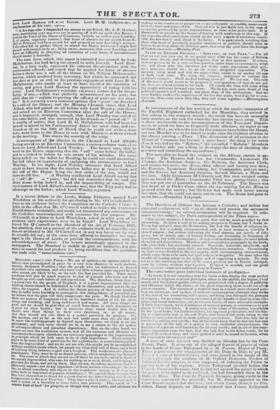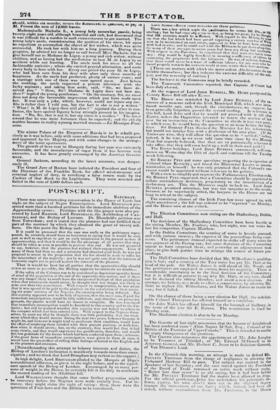The Dutchess of Orleans has become a Catholic ; and
before her expected confinement, will " go to church and receive the sacrament tmostentatiously ;" no solemn recantation will be required. In retie truce to t his subject, the Paris correspondent of the 7'imes says- " Exvept the devotees, I know no party that will be much gratified by this proceeding. Religion is said to be makink progress in France, but I doubt it. Every boy and gill, since the Restoration, has had the benefit of religious in- striimion ; has regularly communicated, and, in most instances, worthily I should suppose; but crimes, indicating the total absence, not merely of reli- gious, but of moral, nay, of human feeling, are increasing in frequency of occurrence, and with circumstances of m2gravation that intlicate the most hellisk thoughts and dispositions. Murders and a•sas•inations, principally by the knife, take place daily, but are hardly noticed. Pat-tickle, fratricide, infanticide, and suiehle, which equally occur daily, ate very little more attractive. Occasionally we have crimes detailed in the newspapers, with accompanying circumstance., which cause them to be read, but lead only to he forgotten. No man takes the trouble of tracing crime to its (nigh', and of suggesting a remedy. No man rtfiTS to the notoi ions fact that idi tlic worst passions are in France indulged. even by iofants, without reprehension. It ligion is scouted, and one great vice— e;;oisme—exereises universal sway in France."
The same writer gives individual instances of profligacy- " In truth, it is not surprising that the lower orders display the most perfect
disregard to religious or moral principles, when in the middle, the higher, I had nearly slid the highest grades, crimes ale perpetrated with a degree of publicity and effrontery which the silence of the press respecting them would not allow you to suppose. The amours of a married man in a much more elevated posi- tion are notorious, and spoken of without c lemnation, although they strike at the root of his interesting wife's peace, and bring into disrepute the precepts of religion ; for no young man in existence hail the benefit of more zealous, reli- gious, and moral instructi ,,,,, nor, in his own family, of more admirable example. A little lower down, we foal intrigues of married persons so notorious as to put shame it-elf to the blush. A young man of the name of Duranton, remarkable for his good looks,' his faultless toilette, his apparent good-nature, and hie fide- lity to a particular seat in the cafi'. Pat is, shot himself last week, owing to the failuie of -tone joint-stock or stock.jobbieg speculations. This was bad, far it involved gambling and suicide ; but all the veurld knew that he W98 the bon ami or p tramour of the lady of a person in very creditable circumstances, the daughter of a person well known in the literary world ; and in aid of this scan- (Wow, impression came the fact, that the lady flew to his dying couch, for he lingered foi a short time, and never quitted it until he ceased to breathe, when she returned to the conjugal roof."
A en=e of some interest was decided on Monday last lay the Cout Royale, Paris. It arose out of the alleged deposit of papers of value in the hands of Prince Tulleyrand by it M. Possoz, Alayor of Passy. Those papers were the engagements of the Duke de Ditto to pay M.
a sum of 1:2.0tat italics ; and were placed in the hands of the
hit..., (through the medium of M. Gabriel Delessert, Prefect of Polity,) for the purpose., it was supposed, of inducing the Prince to pay the dcbt of his nephew. Prince Talleyrand pleaded before the Cum de Preteliare Instancy, that he had not opened the parcel in whick the papers were stated to be enclosed, but had forwarded them to the Duke de Dino. The Comic de Premiere Instance, giving credit to the statement, mnisuited the plaintiff; but M. Possoz appealed to the (our Royale against that decision ; and which Court, thou:tit its Pre- sident, Baron Seguier, on Monday ordered that Ptince Talleynuid should, within six months, return the documents in question, or pas to Possos the sum of 12,000 francs.
Mademoiselle Nathalie S., a young lady somewhat passee, being twenty-eight years old, although beautiful and rich, had discovered that it was difficult for a maiden in such circumstances to get married. The young lady's uncle, commiserating the position of his niece, hit upon an expedient to accomplish the object of her wishes, which was quite successful. He took her with him on a long journey. Duriog their progress, he advised her no longer to call herself Miss Nellielie, but to give herself out as Madame de Ligny, a young; and rich widow, without children, and as having had the misfortune to lose M. de Ligny Ity man accident while out hunting. The uncle took his niece to all the fashionable societies ; where she excited general admiration, and merle every body in love with her. Every one pitied the poor Al. de Ligny, who had been torn from his deer wife after only three months of happiness. As the uncle had predicted, plenty ot suitors came; and a marriage with one of them was soon agreed upon. Just before the wedding, the uncle requested a private interview with the lucky aspirant ; and taking him aside, said, "Sir, we have de- ceived you." " How, Sir ! Aladame de Ligny does not love me, then ?" replied the young gentleman. " On the contrary, Sir, my niece does not deny the favourable impression which you have made upon her. It was only a joke, which, however, could not injure any one. She is richer than I told you, but the fact is she is nut a widow " " What ! is M. de Ligny then still alive?" rejoined the other in con- fusion, the laws against bigamy being strongly present in his imagine tion. "No, Sir, that is not it, but my niece is a maiden." The lover owned that he was more fortunate than he expected ; and the elderly maiden became in reality a young married WOMall.—La Musaique Fran- caise.



























 Previous page
Previous page